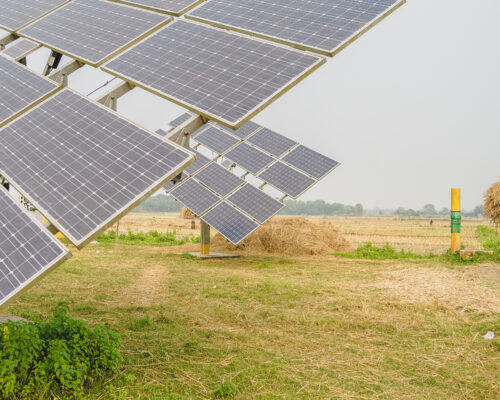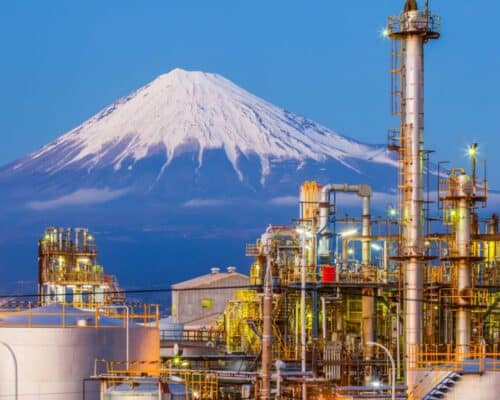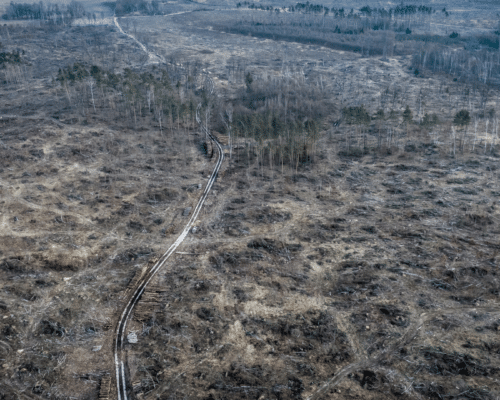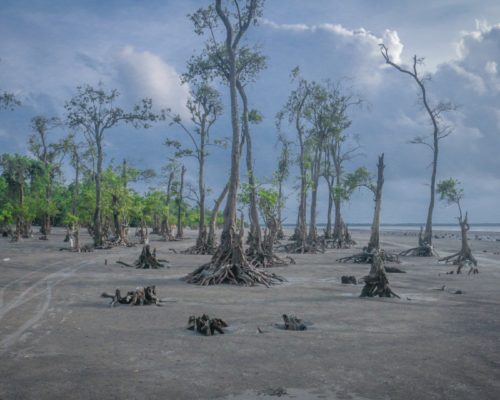Implementing Wealth Taxes to Fund an Equitable Energy Transition in Indonesia [Op-Ed]
Photo: Shutterstock / Kemarrravv13
28 April 2025 – by Sita Mellia
The recent budget cuts affecting virtually all of Indonesia’s ministries under the new Prabowo regime may significantly impact the pace of Indonesia’s energy transition. More specifically, the Ministry of Energy and Mineral Resources (ESDM) has had its budget slashed by around 1.6 trillion IDR, potentially weakening its supervisory functions regarding Indonesia’s energy transition.
This development can potentially disrupt Indonesia’s climate commitments and energy transition plans. Indonesia must expedite its energy transition to fulfil its stated NDC and align with the 1.5°C Paris Agreement target. This need for a consistent push towards decarbonisation in the energy sector would be best achieved by strategically implementing alternative funding options. Therefore, a well-designed wealth tax could be the silver bullet Indonesia needs to get its energy transition plans back on track.
Why Tax the Super-rich?
First, a wealth tax is also appropriate as a form of mitigating carbon emissions from the activities of the super-rich. Oxfam’s 2022 study shows that the world’s 125 richest billionaires contribute 3 million tons of CO₂ annually through their investments. This is a million times larger than the average emissions of the bottom 90% of the population. In Indonesia, about 1% of the super-rich have an estimated carbon footprint of 42.2 tons per capita. Their footprint far exceeds the average carbon footprint of the bottom and middle-income groups at around 1.4 and 3.5 tons per capita, respectively.
Subsequently, half of the 50 richest Indonesians also own mining businesses commonly associated with intensive carbon emissions and environmental degradation. The biggest victims of these businesses are the poor communities living around mining areas. For example, communities in villages near mineral processing facilities bear the brunt of health costs due to their pollution – with annual losses at risk of reaching US$3.42 billion (Rp55.6 trillion) by 2030. High carbon emissions also exacerbate disasters caused by the climate crisis – endangering the lives of the lower middle class as they are the least able to adapt to extreme weather conditions and rising sea levels.
An Untapped Hoard
CELIOS’ 2024 report shows that taxing half of the trillionaires among the 50 richest people in Indonesia will contribute around 2.3 thousand trillion IDR to the state’s coffers. The total revenue from taxing 50 trillionaires is 81.6 trillion IDR per year. If the government imposes a wealth tax on the 50 richest people starting this year, the revenue could contribute around 30% to the energy transition fund – which needs an estimated 4,000 trillion IDR by 2040.
This figure can also be utilised to compensate for economic losses in the three largest mineral storage provinces – namely South Sulawesi, North Maluku, and Central Sulawesi – which have experienced a decline in GDP in their ninth year of nickel smelter operations. In addition, wealth taxes could also be utilised to bolster the economic resiliency of regions such as East Kalimantan and southern Sumatra. These two provinces are at risk of being affected by the energy transition as the reduced use of coal could affect local livelihoods, which is why a precision wealth tax would help realise a more equitable transition in these provinces.
Subsequently, the wealth tax could also assist in the early retirement of CFPPs—including the delayed 1.3 billion USD (21 trillion IDR) early retirement plans of the Cirebon-1 CFPP. By applying a wealth tax to its 50 trillionaires starting in 2025, Indonesia can end the operation of the Cirebon-1 CFPP by around 2027 or 2028—markedly earlier than the original plan of 2035.
Observing the OECD
Indonesia would do well to examine how progressive the wealth tax is in OECD member countries. The OECD has three countries that impose a net wealth tax that includes property and financial wealth: Norway, Spain, and Switzerland.
Switzerland, with the fourth-best tax system in the OECD, has imposed wealth tax since 1840 as a major source of revenue until the First World War. All states in Switzerland impose wealth tax at a rate of 0.05%—0.45%, based on gross worldwide asset balances minus debts. Assets reported are bank account balances, bonds, stocks, life insurance, cars, boats, aircraft, property or real estate, and other valuable assets such as paintings and jewellery.
Meanwhile, the property tax levied in Switzerland is based on the value of the property—the amount of money the individual spent to pay for the property minus any outstanding debts. The property tax rate in Switzerland is 0.02%—0.3%, depending on the value of the property, the length of ownership, and the city where the property is located.
In addition, property owners in Switzerland are required to pay property gains tax, property transfer tax, and rental value tax. Even though general household assets, foreign real estate, and private pension wealth are exempt from wealth tax, property taxes in Switzerland contribute around 7.3% to its state income—higher than the OECD average of 5.6%.
Revenue Coffers
Potential state revenue could be even greater if the state imposes not only a wealth tax but also a sustainability tax. CELIOS’ 2024 study shows that – by imposing a combination of carbon tax, coal production tax, windfall tax, and 2% super-rich tax – the potential state revenue could reach 222.78 to 241.62 trillion IDR per year, enough to fund the energy transition as well as the social responsibility of mining companies to affected communities.
To realise these gains, Indonesia could follow the example of one OECD member country that has implemented a windfall tax on the fossil energy sector—the Czech Republic. The Czech Republic imposes a 60% tax on companies in the energy and fossil fuel sector with an annual turnover of at least CZK 2 billion. This tax is also imposed on banks with net interest income in 2021 of at least CZK 6 billion.
Looking for Leadership
During the G20 Summit forum in Brazil at the end of 2024, President Prabowo said that wealth enjoyed only by a few people is a recipe for a failed state. Unfortunately, there has yet to be any meaningful follow-up on addressing this issue.
Taxes – as one of the instruments of social justice – in Indonesia today are not progressive and tend to only burden the middle class and the poor. Subsequently, Indonesia has yet to implement a wealth tax provision to avoid that failed state recipe the president mentioned. Indonesia does have a higher income tax rate of 35% for those with a yearly income of over 5 billion IDR, but this does little to address the issues at hand. The Indonesian government can start designing a wealth tax rate of 0.05% to 2% to reverse the situation – as the OECD exemplifies. Furthermore, this 2% wealth tax for the super-rich is the indicated minimum agreed upon by G20 finance ministers in their July 2024 meeting in Rio de Janeiro.
Finally, it is important to note how popular support for greater reforms throughout the global political and economic systems – especially regarding wealth distribution – has reached 65% globally. According to an IPSOS Global survey in 2024, which includes a sizable sample of 1,000 respondents from Indonesia, most of its 22,000 respondents support broader economic systems reform throughout the G20. Most support greater governmental climate mitigation actions and more progressive taxation to support said programs.
Therefore, it is clear that Indonesia just needs to follow through on the president’s remarks to avoid becoming a failed state due to its unequal wealth distribution. More progressive taxes—including a commensurate wealth tax—could be instrumental in accelerating Indonesia’s energy transition and setting it as a regional leader in climate action financing.
Sita Mellia is a writer for TransisiEnergiBerkeadilan.id focusing on energy transition policies and their impacts on vulnerable populations. Sita believes climate justice is integral to welfare and has extensive experience working on this issue with various CSOs.
Disclaimer: The views and opinions expressed in this article are those of the author and do not necessarily reflect the official policy or position of Energy Tracker Asia.
This article was first published on www.TransisiEnergiBerkeadilan.id and republished with permission.








